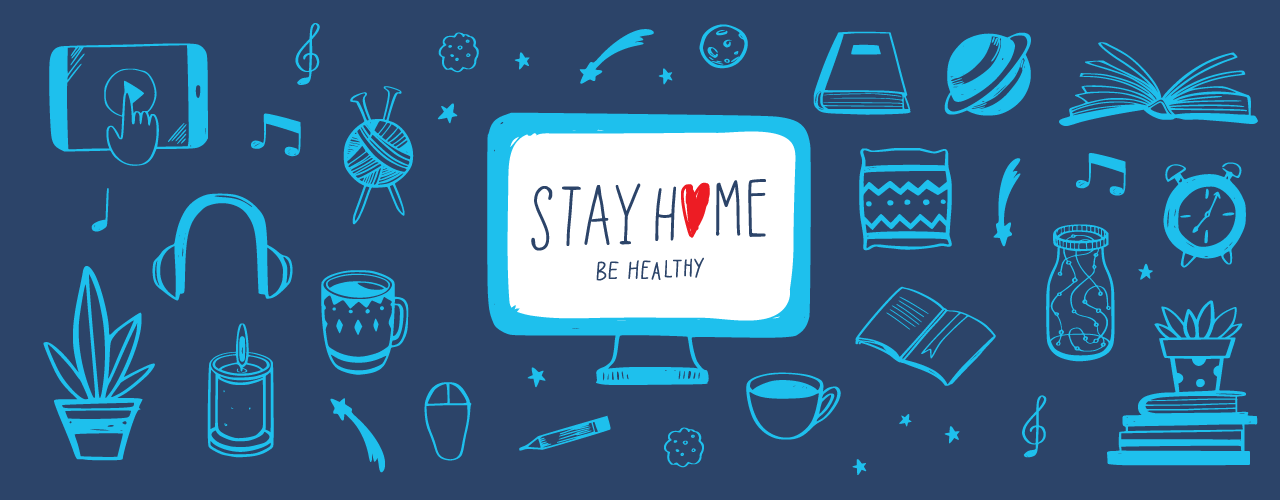It’s no secret that the recent COVID-19 pandemic put its stamp on the way we experience everything right now. Simple things — such as greetings, traveling, shopping, working and socializing — are no longer happening in the same way we’re used to. One of the consequences of this shift is that many of us are experiencing anxiety and stress that we do not quite know how to cope with. So,
CommercialCafe reached out to experts for advice on mental health support regarding several key issues:
Our Experts

Guillermo Castañeda, M.Ed.
Licensed professional counselor and certified hypnotherapist at Counseling of El Paso

Cathleen Swody, Ph.D.
Industrial/organizational psychologist, and managing partner at Thrive Leadership
A lot of people working from home are experiencing anxiety because of the coronavirus outbreak. What would be the most important piece of advice you could give them?
Mary Alvord
“It’s important to focus on what we can control and what we can do, rather than those aspects of the stay-at-home orders and the virus that are out of our control. Thus, we can do our best to exercise precautions advised by medical professionals and epidemiologists, and structure our time at home to do activities that we enjoy, as well as work we must do.”
Guillermo Castañeda
“Just remember that this is temporary. The most important thing in our life is our health. While we are not living in the most optimum circumstances, every second spent at home is a higher percentage of staying healthy.”
David Cates
“I recommend limiting your media consumption. While it is essential to get the facts, social media and dramatic headlines often amplify our fears because they are designed to grab our attention. I suggest getting information from reliable sources, such as your healthcare provider, the Centers for Disease Control and/or your local health department. Also, consider your personal risk, what you are afraid of and how likely that is to happen.
Remember that even if you or a loved one actually contract the coronavirus, the vast majority of cases are eventually cleared, and many without any treatment. We tend to overestimate the likelihood of a bad outcome and underestimate our ability to manage tough situations. At the same time, if you do have some anxiety and worry, remember that it’s normal. Don’t get down on yourself for having these feelings. We don’t need to layer on anxiety, guilt or depression about being anxious in the first place.”
Allan Chrisman
“Stay calm, practice safe social distancing outside the home while continuing to be appropriately (practice handwashing and avoid touching your face) affectionate with your family. Kids need hugs. Don’t isolate from each other at home, and limit your exposure to media catastrophizing messages.”
Baruch Fischhoff
“Do the best that you can to deal with the situation. Don’t be too hard on yourself if you can’t find perfect solutions, or if things go wrong, despite your having done your best. ‘Outcome bias’ occurs when we judge decisions by how they turned out, rather than how thoughtfully they were made. ‘Hindsight bias’ occurs when we exaggerate how predictable the future was after we know how it turned out.”
Cathleen Swody
“As much as possible, focus on what you can do and what you can influence. So often, people tend to think about things beyond our control, and that can lead to feelings of anxiety, frustration, and helplessness. Recognize what is beyond your control, put it to the side, and put your time and effort into what you actually can do — the choices you make, how you communicate and healthy habits.”
Bethany Teachman
“I would let them know that it is natural to experience some anxiety at this time and tell them that it will be easier to manage this stressful time if they view it as a collective challenge that will require shared sacrifices to achieve a difficult — but not impossible — goal, as opposed to an insurmountable threat that they cannot possibly manage. It can also help to remember that this incredibly difficult period will not last forever and history shows us, time and time again, that humans are resilient.”
How could employees cope better with social distancing, especially not interacting with their colleagues?
Mary Alvord
“There is a difference between physical distancing and social distancing. Social connections are critical to our well-being. While we can’t see our colleagues in-person, we can and should reach out via video chats, texts, emails, phone calls and other ways to connect.”
Guillermo Castañeda
“Breaks are important. Even when we are not having a face-to-face with our colleagues, it doesn’t mean that we cannot call them, e-mail, video call, or chat with them every now and then. We can still have interaction with our colleagues, but now at a distance.”
David Cates
“Employees need to be intentional about connecting with others who can provide social support. We know that social support is an essential buffer of stress. Reach out via telephone, email, social media, text message, etc. Maybe plan to have a virtual lunch with a close friend or colleague.”
Allan Chrisman
“Use alternate methods to socialize, for example, bump elbows, acknowledge others through nonverbal means and verbal greetings and use guidelines for personal protective equipment. For example, face masks can be a sign that you are contributing to the protection of others.”
Cathleen Swody
“Connecting with other people helps motivation, creativity, and reality testing. With social distancing, we are missing seeing people and informal communication. Be deliberate in carving out time to meet virtually, including regular one-on-one meetings with your manager, as well as your direct reports. This also is a great area to get creative and have a little fun. For example, use video conferencing for 30-minute catch-up chats with colleagues over breakfast or lunch. Actively connect with people outside of work with calls or FaceTime. These conversations will feel more meaningful than passively scrolling on social media.”
Bethany Teachman
“A key is to recognize that social distancing should not equal social isolation. It is especially important at this time to reach out to people virtually and stay connected. You can view it as a trial and error period to find out which methods work well for you. Do you enjoy the online book groups that have formed, playing virtual games with family, or just prefer to share a cup of coffee with a friend over a FaceTime or Skype call?”
How should people working from home organize their “workday” so that they feel almost the same as in the office?
Mary Alvord
“Consider starting the day as you normally would, whether it’s eating breakfast first or grabbing coffee in the car. Instead of the car, go outside for a walk to delineate the start of your day. Set up your work space to be comfortable. And, just as you get up and take breaks to walk and talk with someone when at your workplace, make sure you build in those short breaks by getting physical movement and talking with someone.”
Guillermo Castañeda
“People working at home should keep a schedule as best as possible. The need for alarms is even greater now. People should also make their workplace at home comfortable and would benefit from having similar decorations as their place of work.”

David Cates
“I suggest trying to structure and schedule the ‘workday’ as much as possible, including negotiating with family members regarding times when you are not to be interrupted and times when you will be available (for example, ‘break times’). During work time, you need to minimize noise and distraction by identifying a space that can be relatively insulated from the rest of the home.
During the workday, I think we also need to be intentional about insulating ourselves from news, which can increase stress and anxiety and, therefore, distract from the tasks at hand. And, be careful not to set yourself up for failure. If you have children, for example, structure the day so that you can attend to the necessary childcare — such as getting them up in the morning — with your complete attention, and then shift to work once you have successfully handed off childcare to your partner, daycare provider, etc. It may also help to set realistic goals for what you hope to accomplish ‘at work’ on any given day.”
Cathleen Swody
“Think about the workday in terms of cues. Keep a morning routine. Shower, change out of pajamas and move into a workspace to get your mind in the zone to focus on work. There are cues throughout the day that tell us, ‘we’re working and it’s time to focus.’ Create a general structure for the day, such as when you have meetings, and block off time for prioritized tasks. Try to start and finish the workday at similar times as you would in the office. Many people have a hard time disengaging from the workday when they are suddenly working from home. Making a deliberate choice to wrap up at a certain time and engage in relaxing activities will enable you to recharge for the next day.”
Increasingly, companies are sending their employees to work from home. That means that a lot of people are around their children all day. How can they help children not to feel overwhelmed or stressed when watching the news?
Mary Alvord
“Limit the news and be aware that children hear and see what you are watching. Younger children, especially, can misinterpret what they hear. Ask them what they know about the situation, and if they have questions. Open the door to discussion, but it’s got to be developmentally appropriate.”
Guillermo Castañeda
“Companies should provide the employee with moral and emotional support or with resources. They would benefit from lowering their standards of productivity, as well, since it will be impacted if there are children at home.”
David Cates
“Limit and closely monitor children’s news consumption. Explain COVID-19 in simple terms and explain the purpose of staying at home in an age-appropriate manner. Remember that it’s better for them to hear it from you. You can explain that staying home is a nice thing to do because it keeps other members of the community safe. This can promote their sense of being altruistic. Ask children what they know about what is happening. That way, you can correct any misconceptions. Check in with them regularly to manage any new fears or misunderstandings. Allow children to ask questions. Remind children that being at home is temporary. If they are concerned, you can reassure children they will receive medical care if they become ill.”

Cindy Smith
“From my perspective, one of the biggest ways that parents can help children is by taking care of themselves. Children are picking up on the stress around them; if parents are feeling overwhelmed, children can see it. If parents are able to cope with their feelings, then they will be better parents to their children. When we are feeling stressed, we are more likely to react negatively to children or use parenting strategies that are more negative, such as yelling or threatening children. One way to decrease stress for both parents and children is to engage in activities that parents and children both find enjoyable. Taking time to play with children can increase the positive mood of both.
I would limit what news children can see, especially with younger children who would not understand what is being broadcast on the news. The most important piece is being present with children and engaging in fun activities. During these opportunities of positive parent-child interaction, children might feel more comfortable asking questions or expressing their fears and worries. What we tell children depends upon their age and their ability to understand these complex issues. The C.D.C. has published guidance on how to talk to children about COVID-19.”
Bethany Teachman
“I encourage people to limit how much COVID-19 news they watch. Of course, people need to read reliable news sources to stay informed, but having news on 24/7 gets overwhelming for most people and makes them feel like they’re in a constant state of threat. So, check in a couple of times a day to stay informed, and then talk to children in age-appropriate ways about what is happening, reminding them that there are adults who are there to take care of them and that you face challenges as a team. Maintaining routines and structure for children and letting them know what they can do to make it safer for themselves and everyone — for example, hand washing, social distancing, etc. — can give children a sense of control, which is very helpful.”
What are your thoughts on keeping up with the news? Is it helping us cope with the situation or does it make it worse?
Guillermo Castañeda
“We need to be aware of what is going on around us within limits. Watching about 10-15 minutes of news after work is helpful to find out if there is important information from the day, such as a new city ordinance or other such information. The news really does not change from day to day anymore, and the changes are so minimal that we don’t need to watch hours and hours of news coverage. The more we watch, the more our brain and body will react with anxiety.”
Baruch Fischhoff
“Find a very small number of sites that report things well. Perhaps three national and international websites, one local (if you’re lucky enough to have one), and your state or county health department. Check those sites once a day. Usable news doesn’t change that quickly. Avoid sources that try to work your emotions. TV does that for many people. How much TV people watch is a good predictor of how stressed they feel.”
Alison Holman
“I would recommend people use one or two trusted, reputable sources for their news — W.H.O., C.D.C., Johns Hopkins — get the info they need for the day, and then focus on something else. Do not spend hours scouring news sites for more information. Pay attention to whether the news sources you are using are encouraging click-bait. Highly emotional stories are designed to get you to spread them. That is a sign that the story may be from an untrustworthy source.”

Cindy Smith
“Personally, I think watching the news is overwhelming, but what works for people is going to vary greatly. I think that a lot of the stress and anxiety that many of us are feeling is related to being in a situation that we have not dealt with before and have no control over. Many of our coping strategies are not available to us because we often seek out social support to help us cope. We can still use social support, but it needs to look different and likely needs to be planned because we won’t be running into friends at work or other gatherings.
Watching the news may help some individuals feel in control or support their coping, but it can quickly become overwhelming. It might be good to decide how long to watch or read the news; for example, saying that you will watch the news for 30 minutes and then go outside to take a walk. I also recommend focusing on things that you can control, such as making choices that support the health of you and your family — for example, choosing to follow social distancing guidelines, following guidelines on washing hands correctly and choosing to stay at home as much as possible.”
How can parents working from home manage the situation better so that their productivity is not affected?
Mary Alvord
“This is a challenging time for parents trying to work full-time while at the same time managing their children. I suggest that parents and caregivers designate times with kids and off times with kids, and rotate between the parents or caregivers. That way, they can fully attend to work when they are ‘off kids’ and fully attend to the children when they are ‘on.’ This might make the workday longer, with longer breaks in between. Make sure to take time to all eat a meal together.”

Guillermo Castañeda
“If the children at home are little, the parent could be flexible in his/her schedule, but try to stick to it as much as possible. If there are two parents at home, this is the time to tag-team. If the children are older, parents should teach the child to keep a schedule similar to their school’s. There are plenty of options out there — some even free — of educational courses and entertainment. While I am not an advocate of overuse of technology for children, when a parent needs time for work and there is nobody else able to look after them, it is okay to use technology now.
Again, this is temporary. Eating breakfast, lunch, and dinner as a family is important if there is a possibility to do so. After work, the employee should play with their children as much as possible, while also getting some time alone now and then. Relaxation and meditation are really important to relax and, if there is an option, the employees would benefit from telehealth therapy to process their feelings.”
David Cates
“Create and follow a daily routine. This is critical for you, as well as for your children, as it preserves a sense of normalcy. Ideally, this would include time for work, exercise, hobbies, learning, etc. Also, try to spend some time outdoors each day, if possible, within recommended safety guidelines.”

Cindy Smith
“Our productivity is going to be affected; there is no way around it because we are trying to work from home and parent our children. In many of these cases, our children have school work that needs to be managed, in addition to our own work that needs to be done. During this time, it is important to recognize and accept that we will not be as productive as we have been in the past because we are trying to do so many things and cope with the stress that we are feeling. It may help to set up work spaces that support the parent and the child.
Communication is important, too. For example, letting children know when they can interrupt your work and when they cannot. Other strategies that may help include providing children with clear goals for their work or developing a family schedule. The stressors for families where the parents cannot work from home are also important to consider. Their needs and stressors are likely to look different in some ways. Some parents need to work outside of the home, which creates stress related to finding safe places for their children while they are working.”
Many people experience stress regarding the coronavirus outbreak. What are the health effects of stress and how can we manage them better?
Alison Holman
“Stress has known effects on physical and mental health. It can produce symptoms of anxiety, depression and post-traumatic stress. All of these mental health problems are associated with greater risk for a variety of physical health problems, such as cardiovascular ailments, immune system challenges, gastrointestinal disorders, etc.
I would strongly recommend people limit how much COVID-19 media coverage they consume. High exposure to media coverage of these kinds of events is associated with higher levels of acute stress, and acute stress is associated with various physical and mental health consequences later on.”
Online and Offline Mental Health Support Resources
National reach resources
- SAMHSA’s National Helpline is 1-800-662-HELP (4357) — with TTY available at 1-800-487-4889 — is a confidential, free, 24/7, 365-days-a-year, information service, that is available in both English and Spanish, for individuals and families facing mental and/or substance use disorders. This service provides referrals to local treatment facilities, support groups, and community-based organizations for mental health support. Callers can also order free publications and other support information.
- The National Alliance for Mental Illness (NAMI) offers mental health support resources and guidance. See https://www.nami.org/find-support/nami-helpline. NAMI also offers a website dedicated to COVID-19 specific assistance. Check it out here
- The National Suicide Prevention Lifeline is available at 1-800-273-TALK (8255)
- The Depression and Bipolar Support Association provides education, tools, and peer support to the more than 23 million Americans struggling with mood disorders. In light of the current national health crisis, the DBSA is opening more online support groups to meet the need for caring and connection, as well as a COVID-19 response website: https://www.dbsalliance.org/covid-19/
Hotline: 1-800-273-TALK
text DBSA to 741-741
- The National Center for PTSD COVID-19 resources for managing stress are available in both English and Spanish, for individuals, as well as for health care workers, and for providers and community leaders
- While the Anxiety and Depression Association of America (ADAA) is not a direct service organization, it does provide resources both for professionals and for the general public. Check out the ADAA blog for helpful insights.
US state and local mental health support resources
Alabama COVID-19 information and mental health support resources:
Alaska COVID-19 information and mental health support resources:
Arizona COVID-19 information and mental health support resources:
Arkansas COVID-19 information and mental health support resources
California COVID-19 information and mental health support resources
Colorado COVID-19 information and mental health support resources
Connecticut COVID-19 information and mental health support resources
Delaware COVID-19 information and mental health support resources
District of Columbia COVID-19 information and mental health support resources
Florida COVID-19 information and mental health support resources
Georgia COVID-19 information and mental health support resources
Hawaii COVID-19 information and mental health support resources
Idaho COVID-19 information and mental health support resources
Illinois COVID-19 information and mental health support resources
Indiana COVID-19 information and mental health support resources
Iowa COVID-19 information and mental health support resources
Kansas COVID-19 information and mental health support resources
Kentucky COVID-19 information and mental health support resources
Louisiana COVID-19 information and mental health support resources
Maine COVID-19 information and mental health support resources
Maryland COVID-19 information and mental health support resources
Massachusetts COVID-19 information and mental health support resources
Michigan COVID-19 information and mental health support resources
Minnesota COVID-19 information and mental health support resources
Mississippi COVID-19 information and mental health support resources
Missouri COVID-19 information and mental health support resources
Montana COVID-19 information and mental health support resources
Nebraska COVID-19 information and mental health support resources
Nevada COVID-19 information and mental health support resources
New Hampshire COVID-19 information and mental health support resources
New Jersey COVID-19 information and mental health support resources
New Mexico COVID-19 information and mental health support resources
New York COVID-19 information and mental health support resources
North Carolina COVID-19 information and mental health support resources
North Dakota COVID-19 information and mental health support resources
Ohio COVID-19 information and mental health support resources
Oklahoma COVID-19 information and mental health support resources
Oregon COVID-19 information and mental health support resources
Pennsylvania COVID-19 information and mental health support resources
Puerto Rico COVID-19 information and mental health support resources
Rhode Island COVID-19 information and mental health support resources
South Carolina COVID-19 information and mental health support resources
South Dakota COVID-19 information and mental health support resources
Tennessee COVID-19 information and mental health support resources
Texas COVID-19 information and mental health support resources
Utah COVID-19 information and mental health support resources
Vermont COVID-19 information and mental health support resources
Virginia COVID-19 information and mental health support resources
Washington COVID-19 information and mental health support resources
West Virginia COVID-19 information and mental health support resources
Wisconsin COVID-19 information and mental health support resources
Wyoming COVID-19 information and mental health support resources
If you are looking for a highly flexible work environment that is closer to home or to the amenities that are essential to your work-life balance, consider booking a coworking space near you! Select any of the markets linked below to check out local availabilities and easily secure your spot.
Last modified: March 25, 2025
Lorena is a marketing communications specialist and writer at CommercialCafe. She discusses topics such as commercial real estate, office design & architecture, mental health, career development, marketing, and more with various industry experts/ professors through interviews and expert roundups. You can reach out to her at
[email protected].













[…] many people, adjusting to the new life was quite difficult. However, living in the 21st century exposes us to new technologies that can help make life […]